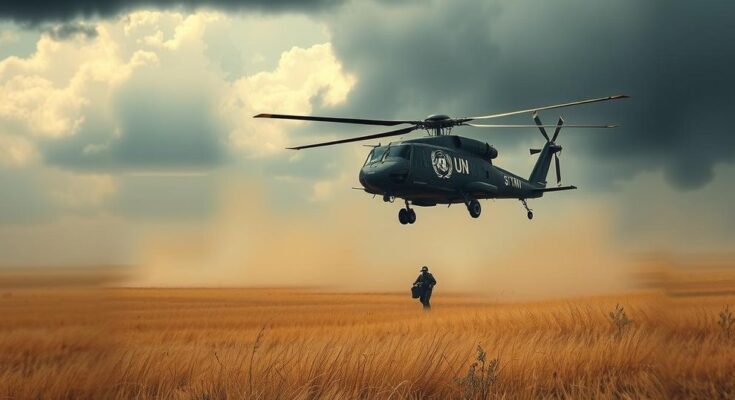A United Nations helicopter was attacked in South Sudan during a mission to rescue wounded soldiers, resulting in one crew member’s death and two injuries. This incident occurred amid rising political tensions and fears of renewed civil conflict due to the fragility of a power-sharing deal between leaders Salva Kiir and Riek Machar. The situation remains critical as the nation grapples with instability.
On Friday, a United Nations helicopter was attacked during an evacuation mission in South Sudan, resulting in one death and two injuries among the crew. The helicopter was attempting to rescue wounded South Sudanese soldiers in Upper Nile State, where the situation has become increasingly tense. Tragically, it was reported that the wounded soldiers also lost their lives in the incident, which prompted speculation about the circumstances of the attack, including whether the helicopter was airborne or on the ground when fired upon by the White Army group.
This violent episode occurs amidst escalating political unrest in South Sudan, which is facing the threat of renewed civil conflict. In response to the turmoil, President Salva Kiir expressed his determination to maintain peace, stating, “Let no one take law into their hands. The government which I lead will handle this crisis.” However, many observers criticize both Kiir and rival leader Riek Machar for their roles in exacerbating the crisis.
The fragile power-sharing agreement formed by Kiir and Machar in 2018, which ended a devastating civil war, is now under significant strain. Recent clashes between their factions in Upper Nile State have raised alarms about the potential collapse of this agreement. South Sudan’s information minister indicated that 27 soldiers were killed during the helicopter attack, though this number remains unverified.
In light of the increasing instability, there is a sense of urgency for the international community to monitor the situation closely. As South Sudan’s political environment deteriorates, the risks of further violence loom large, emphasizing the need for effective crisis management and diplomatic engagement.
The attack on the U.N. helicopter underscores the precarious state of affairs in South Sudan, where a fragile power-sharing deal is on the verge of collapse. As political tensions escalate, the government has vowed to maintain order, yet critics hold leadership accountable for the crisis unfolding. The incident reveals the urgent need for diplomatic efforts to stabilize the situation in this conflict-prone region.
Original Source: www.nytimes.com




